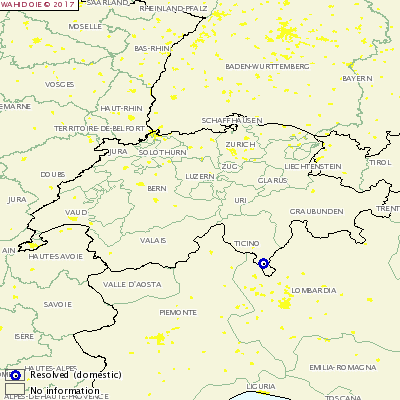Outbreak of Newcastle disease virus in Switzerland
On 20 November 2017 the Chief Veterinary Officer, Mr Hans Wyss, of the Swiss Federal Veterinary Office LIEBEFELD BERNE, Switzerland, notified to the OIE one outbreak of Newcastle disease (NC) in Ticino (Pazzallo, Lugano). The date of start and confirmation of the event was 17 November 2017. The National Reference Centre for Diseases of Poultry and Rabbits, University of Zurich (National laboratory) confirmed the positivity of 3000 birds out of 6000 by RT-PCR test. The owner, in one of his two houses, observed a drop in egg production from 85% to 65% over 2 weeks’ time. In this house, 90% of eggs discolored and many eggs lacked a proper shell. Mortality rate was unsuspicious. The hens in the second house showed no clinical signs. All the animals were killed; carcasses, by-products and waste were disposed of under
By 28 November 2017, several hundred packs of table eggs originating from the affected holding were withdrawn from stores. There were 12 poultry holdings of small size within the protection zone and 103 poultry holdings of small size within the surveillance zone. Sampling of animals within the established protection zone is ongoing. So far, no further cases were detected. Epidemiologic investigations regarding the possible source of infection are ongoing. Until now, it was not possible to test successfully for pathogenicity (F-Gen), as the amount of virus in the samples was too small. However, diagnostic testing is ongoing. Up to today (5 dicember 2017) there are no new outbreaks. Newcastle disease (ND) is a highly contagious and often severe disease found worldwide that affects birds including domestic poultry. It is caused by a virus in the family of paramyxoviruses. The disease appears in three forms: lentogenic or mild, mesogenic or moderate and velogenic or very virulent, also called exotic Newcastle disease. The lentogenic strains are widespread, but cause few disease outbreaks. It usually presents as a respiratory disease, but depression, nervous manifestations, or diarrhoea may be the predominant clinical form. ND is transmitted most often by direct contact with diseased or carrier birds. Infected birds may shed the virus in their feces, contaminating the environment. Transmission can then occur by direct contact with feces and respiratory discharges or by contaminated food, water, equipment, and human clothing. Newcastle disease viruses can survive for several weeks in the environment, especially in cool weather. Generally, virus is shed during the incubation period and for a short time during recovery. The virus is present in all parts of the carcass of an infected bird. The disease is very contagious. When the virus is introduced into a susceptible flock, virtually all the birds will be infected within two to six days. Newcastle disease is a minor zoonosis (disease of animals that can also infect humans) and can cause conjunctivitis in humans, but the condition is generally very mild and self limiting.
© IZSAM December 2017
|
|
Istituto Zooprofilattico Sperimentale
dell'Abruzzo e del Molise "G. Caporale"
Campo Boario | 64100 TERAMO | ITALIA
Telefono 0039.0861.3321 | Fax 0039.0861.332251
e-mail: archivioeprotocollo@izs.it
Posta elettronica certificata: protocollo@pec.izs.it
Partita IVA: 00060330677
Codice Fiscale: 80006470670



